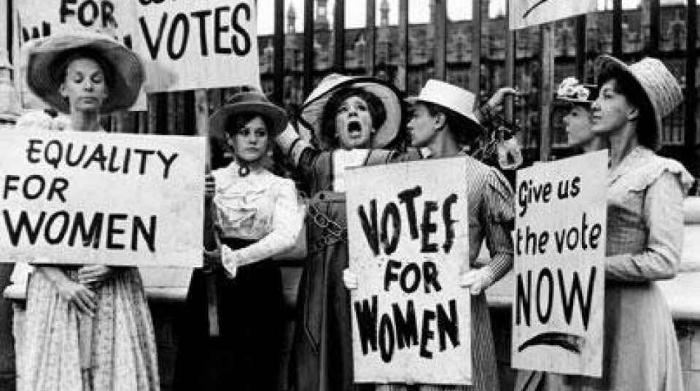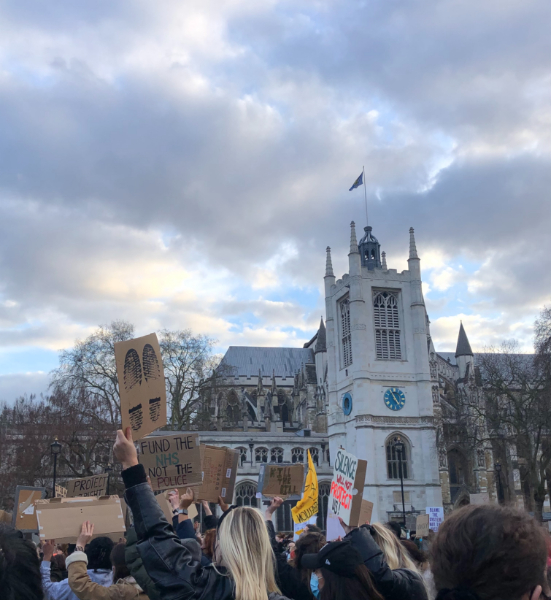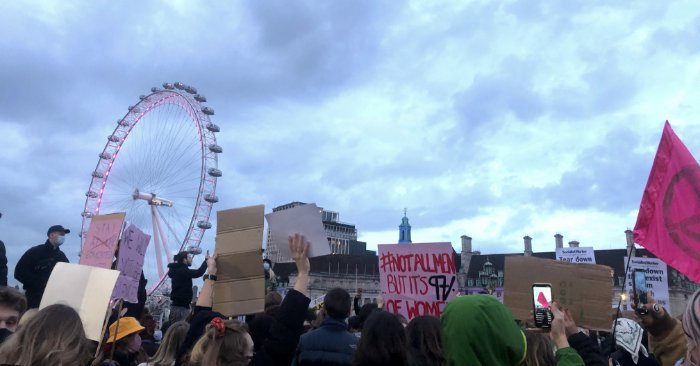The ability to protest is a fundamental human right, and an essential component of democracy. There have been many protests across Europe and the world that have changed the course of history, from the storming of the Bastille in 1789, seen as the symbol of the French Revolution, to the Black Lives Matter protests in Summer 2020 as a result of the murder of George Floyd. However under the recent announcement of an anti-protest bill in the UK, the right to protest has come under threat.
What is the Anti-protest Bill?
The controversial Police, Crime, Sentencing and Courts Bill includes plans to “strengthen police powers to tackle non-violent protests that have a significant disruptive effect on the public or on access to Parliament”. This means that police will have more power to arrest protestors if they think they are causing significant disruption. Additionally, the Bill states that there will be an increase in the maximum prison sentence received for criminal damage to memorials, from 3 months to 10 years. This is a result of the toppling of the Edward Colston statue during BLM protests last July.
The new policing bill essentially uses the Public Order Act 1986 which gives police powers to restrict protests if they are believed to cause serious disruption, damage and disorder. However now there has been a new caveat: noise.
If a protest is considered to be too noisy or cause “serious annoyance,” then police can shut it down - quite literally silencing the voices of people who are speaking out. Additionally the bill will restrict the ability to protest outside Parliament Square and the police will be able to stop any protests that restrict vehicle access - presumably a reaction to protestors frequently blocking Westminster Bridge.
Home Secretary Priti Patel has been clear about her opinions on protests. She has previously said that the Black Lives Matter protests were “dreadful”, and branded environmental group Extinction Rebellion as “eco-crusaders turned criminals” who “[undermine] a functioning society” at a police conference. It is therefore unsurprising that she advocates for the new bill, which gives the Home Secretary more power to decide whether a protest is lawful or not.
The bill was rushed through parliament on 15th March after a vigil to remember Sarah Everard, who was murdered as she walked home, resulted in the police arresting grievers, and a protest against gendered violence happened outside parliament square on the Sunday. This was a slap in the face to activists, who had been protesting against the very powers the police possess, and their use of violence to uphold them.
Labour leader Keir Starmer said the bill contained “next to nothing” about women’s safety, and backtracked on his original plan to abstain from voting to voting against it. Conservative former Prime Minister Theresa May even urged parliament to reconsider the bill, and said: “I would urge the Government to consider carefully the need to walk a fine line between being popular and populist. Our freedoms depend on it.” Despite opposition on both sides the bill passed the second reading on 16th March by 359 votes to 263.
Since then, as a result of nationwide opposition and protest, Labour MP Peter Kyle confirmed that the bill that the government was planning on swiftly pushing through to committee has been delayed until later on in the year.
Implications of the Bill
The bill brings about a contradiction. An essential aspect of protest is that it causes a degree of disruption and noise, in order to propel change. Looking at protests that caused change across history, the majority of them were disruptive. An essential aspect of the Suffragettes’ Votes for Women movement in the 20th century was civil disobedience. The pressure they put on the government was one of the aspects that led to women being given the right to vote in the UK in 1918.

Not only this, but the bill has serious implications for human rights. Article 11 of the European Convention of Human Rights states that, due to freedom of assembly, every individual has the right to protest, march or demonstrate in a public space. Included in this, the police have a duty to refrain from restricting this right unnecessarily and have to protect peaceful protest. The bill attacks this aspect, as protests that are peaceful and non-violent can be broken up if they are causing “inconvenience.”
The Home Office has previously said that the bill does not violate human rights as “the majority of protests in England and Wales are lawful and will be unaffected by these changes.” They said that the measures included in the bill will “balance the rights of protesters with the rights of others to go about their business unhindered.” However the main concern is that the bill will give police an excuse to increase arrests and use force on protestors.
The police in the UK have a history of violence, especially against minority groups. Figures from 2017-2018 showed that Met officers were four times more likely to use force against black people than white people. The bill could mean that police are more likely to target these groups as a result of having more power to decide what is considered lawful. Campaign group Sisters Uncut, who have largely led the movement against the bill, have said: “Policing by consent is a story this country likes to tell about itself. The reality is that policing is unaccountable, aggressive and violent. Targets of police repression – working class people, racial minorities, sex workers and many others – have had enough.”
Human rights campaigners Liberty and more than 150 other organisations have signed a letter to Priti Patel and justice secretary Robert Buckland, stating the bill is “an attack on some of the most fundamental rights of citizens.”
Mass Opposition
Outrage and opposition towards the bill has been widespread. “Kill the Bill” protests have been going on outside Parliament Square this week, organised by Sisters Uncut. However this hasn’t just been confined to the capital - there have been protests across the UK and this week a violent protest broke out in Bristol city centre. More than 200,000 people have signed Netpol’s petition against the bill.

During the first protests against the bill outside parliament on 14th March, Labour MP for East Nottingham Nadia Whittome emphasised that the bill will expand police powers and diminish the right to protest. She said: “This bill will see the biggest assault on protest rights in recent history. If this bill passes, we won’t be able to gather outside Parliament Square anymore in mourning like we are today.”
Labour MP David Lammy gave an emotional speech in parliament about his opposition to the bill, saying that “by giving police the powers to use these powers some of the time, it takes away our freedom all of the time.”
Even though the bill has been delayed for now, campaign groups and activists continue to fight against it. The right to protest is an essential part of democracy - and as a society we should not be silenced for speaking up for what we believe in.


Follow the comments: |
|
